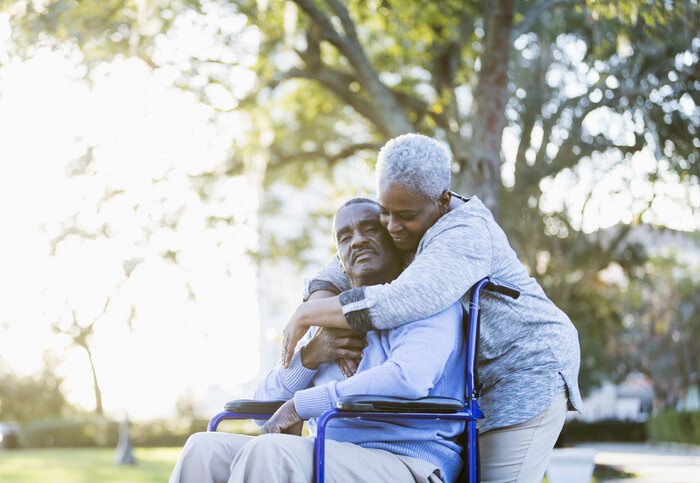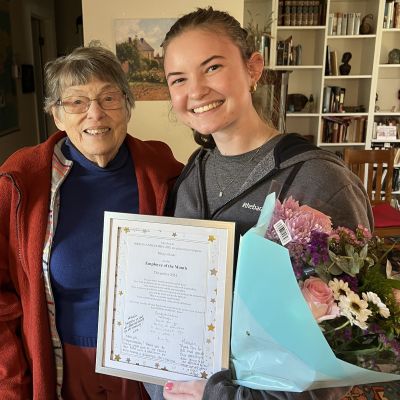Chronic Conditions
How to Empower Seniors to Take Control for Better Chronic Health Care
Seniors know best what they’re dealing with; empower them to take control of their chronic health care needs.
When it comes to chronic health care, seniors are the experts, hands down, with up to three out of four seniors affected by a number of conditions that are ongoing, necessitate long-term medical treatment, and place restrictions on activities. With the never-ending barrage of bloodwork as well as other tests, physicians’ appointments and procedures, and medications, managing chronic diseases usually takes both a physical and emotional toll, and may quickly become daunting.
Dr. Mary Tinetti, chief of geriatrics and internist at Yale School of Medicine, said, “Once you get three, four, or five and six diseases, several things happen: Number one, almost guaranteed, trying to get one of these diseases under control is going to make one of the other … Read More »
End-of-Life Care Tip: Participating in Tough Conversations
When providing end-of-life care, one of the best gifts you can offer is a listening ear.
Sharing what’s on our hearts with those we love is never more important than when someone is nearing the end of life. There are often unspoken sentiments and unresolved issues that, once verbalized, can bring peace and a deeper connection with our loved ones in their final days.
As Dr. Jessica Zitter, physician in critical and palliative care medicine at Highland Hospital in Oakland, CA explains, “Those are opportunities for people to take stock and say, ‘I want to be more intentional about how I want to relate to people in my life.’ Death should really be seen as the last opportunity that you have to make amends and clean things up before you’re in the next world, wherever that may be.”
Read More »
How to Help Someone with Parkinson’s from a Distance
If you’re wondering how to help someone with Parkinson’s disease when you live out of the area, we have four suggestions for you.
The days when extended families lived together on neighboring plots of land are, unfortunately, a thing of the past in many cases. With loved ones spread apart, it’s not always possible to provide the caring, hands-on care and support that older family members often need, especially when a chronic health condition – like Parkinson’s disease – creates additional concerns.
Yet even from a distance, there are still plenty of ways to assist. The Michael J. Fox Foundation offers these tips on how to help someone with Parkinson’s from afar:
Get organized. Take and keep detailed notes about medications being taken, treatments, emergency contacts, and other aspects of the person’s care needs. A digital version of this … Read More »
How to Find Joy Despite Living with Pain or Chronic Illness
Even while living with pain or chronic illness, it is possible to live a full and joyful life.
Have you ever woken up and said, “It’s definitely going to be one of those days!” Maybe your alarm didn’t go off, the hot water heater decided to stop working, and the dog chewed up one of your favorite shoes overnight. Now consider if each day were “one of those days!” For someone living with pain or chronic illness (and that is the majority of the older adult population), routine struggles and challenges may be a given.
However, there are several steps that the elderly can take to discover and maintain a life of joy, even in the face of chronic illness. For instance:
Follow passions. Discovering purpose and meaning in every day is essential – and achievable. Many older adults … Read More »
Caring for Someone with Dementia? Here’s What You Need to Know.
Caring for someone with dementia is easier with help from our experts in elderly care in Pleasanton and nearby areas.
At times, the best lessons in life come through going through them firsthand; yet the wisdom we are able to glean from those who have walked an identical path before us is priceless. If you’re caring for someone with dementia and feeling a bit stressed in this uncharted territory, the guidelines below will help:
How to Respond if You’re Noticing Early Warning Signs of Alzheimer’s
Learn how to best handle addressing early warning signs of Alzheimer’s from our experts in home care assistance in Walnut Creek & the nearby areas.
Our natural instinct when we are picking up on the early warning signs of Alzheimer’s or another type of cognitive decline in ourselves or someone we love is to look the other way, denying that there is a problem. However, the Alzheimer’s Association advises that it’s vitally important to face the issue head-on as quickly as possible, since early diagnosis and intervention allow for the most effective treatment plan to be put into place.
Communication Tips for Dementia: Try Nonverbal Techniques
Sometimes, the most effective way to communicate with someone with dementia is nonverbally.
Conversations with a senior battling with all the challenges of Alzheimer’s, especially in the middle and later stages, is often discouraging – both for you and also for the person with Alzheimer’s. Brain changes impede the ability to listen, process, and respond appropriately to conversations, and it is up to us to employ innovative approaches to communicating to more effectively connect with an individual with dementia.
It’s quite a bit easier than it might appear, however. We already communicate nonverbally in many ways:
Touch
Posture and body movement
Eye contact
Facial expressions
Gestures
Personal space
Consider these communication tips for dementia to include increased nonverbal communication into your interactions with a senior loved one:
Offer reassurance through gentle touch. If a senior loved one is comfortable with touch, hold and pat the … Read More »
Care Tips for Seniors With Dysphagia
Seniors who have dysphagia can benefit from a variety of easy-to-implement care tips.
There’s nothing better than a tall, cold drink on a warm summer day, but for someone with dysphagia, this simple pleasure can be downright dangerous. There are millions of seniors with dysphagia – or trouble swallowing – due to weakened mouth and/or throat muscles. Alzheimer’s, MS, cancer, and stroke are all culprits as well.
Signs of dysphagia include:
Drooling
Coughing, gagging or choking when eating, drinking, or taking medication
A gurgling sound in the senior’s voice after eating/drinking
Additionally, if you suspect dysphagia in an older family member, ask him or her the following questions – and check with the doctor right away for further guidance:
Are you coughing or choking when trying to eat or drink?
Are you having frequent problems with food “going down the wrong pipe?”
Is food … Read More »
How Care Management Can Improve Chronic Disease Care
Care management is an essential component to effective chronic disease care.
Juggling the numerous medical appointments, procedures, tests, medications, lifestyle changes, and more is a way of life for the many seniors with chronic health needs. According to the Centers for Disease Control and Prevention, a full 85% of seniors have at least one chronic health care need, and 60% are diagnosed with two or more. The challenges may seem overwhelming. But there’s one essential component to effectively managing a chronic health condition: care management.
Diagnoses such as diabetes, COPD, heart disease, and more are life-changing. They impact a person’s mental as well as physical health, and it’s important to enlist help in meeting all care needs. Geriatric care managers, also known as aging life care specialists, are skilled professionals with expertise in meeting all of the diverse … Read More »
The Gift of a Homemade Memory Book for Seniors with Dementia
Provide the gift of memories for a loved one with dementia this holiday season.
“Sometimes you will never know the value of a moment until it becomes a memory.” – Dr. Seuss
Memories are what binds together our past experiences with who we are today; and for a senior with Alzheimer’s, confusion around these memories can have a powerful impact. One of our goals as a home care company in Santa Rosa, CA and surrounding areas in caring for seniors diagnosed with dementia is to help them store and share memories in order to make sense of daily life.
A great way to make this happen is through the creation of a memory book, which includes pictures and short descriptions to refer back to when an older adult has questions regarding his or her identity, relatives, etc. A … Read More »















